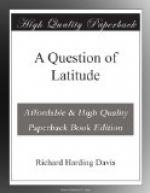“Monrovia is a very small part of Liberia,” said the trader dryly. “And none of these protectorates, or crown colonies, on this coast pretends to control much of the Hinterland. There is Sierra Leone, for instance, about the oldest of them. Last year the governor celebrated the hundredth anniversary of the year the British abolished slavery. They had parades and tea-fights, and all the blacks were in the street in straw hats with cricket ribbons, thanking God they were not as other men are, not slaves like their grandfathers. Well, just at the height of the jubilation, the tribes within twenty miles of the town sent in to say that they, also, were holding a palaver, and it was to mark the fact that they never had been slaves and never would be, and, if the governor doubted it, to send out his fighting men and they’d prove it. It cast quite a gloom over the celebration.”
“Do you mean that only twenty miles from the coast—” began Everett.
“Ten miles,” said the Coaster, “wait till you see Calabar. That’s our Exhibit A. The cleanest, best administered. Everything there is model: hospitals, barracks, golf links. Last year, ten miles from Calabar, Dr. Stewart rode his bicycle into a native village. The king tortured him six days, cut him up, and sent pieces of him to fifty villages with the message: ‘You eat each other. We eat white chop.’ That was ten miles from our model barracks.”
For some moments the muckraker considered the statement thoughtfully.
“You mean,” he inquired, “that the atrocities are not all on the side of the white men?”
“Atrocities?” exclaimed the trader. “I wasn’t talking of atrocities. Are you looking for them?”
“I’m not running away from them,” laughed Everett. “Lowell’s Weekly is sending me to the Congo to find out the truth, and to try to help put an end to them.”
In his turn the trader considered the statement carefully.
“Among the natives,” he explained, painstakingly picking each word, “what you call ‘atrocities’ are customs of warfare, forms of punishment. When they go to war they expect to be tortured; they know, if they’re killed, they’ll be eaten. The white man comes here and finds these customs have existed for centuries. He adopts them, because—”
“One moment!” interrupted Everett warmly. “That does not excuse him. The point is, that with him they have not existed. To him they should be against his conscience, indecent, horrible! He has a greater knowledge, a much higher intelligence; he should lift the native, not sink to him.”
The Coaster took his pipe from his mouth, and twice opened his lips to speak. Finally, he blew the smoke into the air, and shook his head.
“What’s the use!” he exclaimed.
“Try,” laughed Everett. “Maybe I’m not as unintelligent as I talk.”
“You must get this right,” protested the Coaster. “It doesn’t matter a damn what a man brings here, what his training was, what he is. The thing is too strong for him.”




